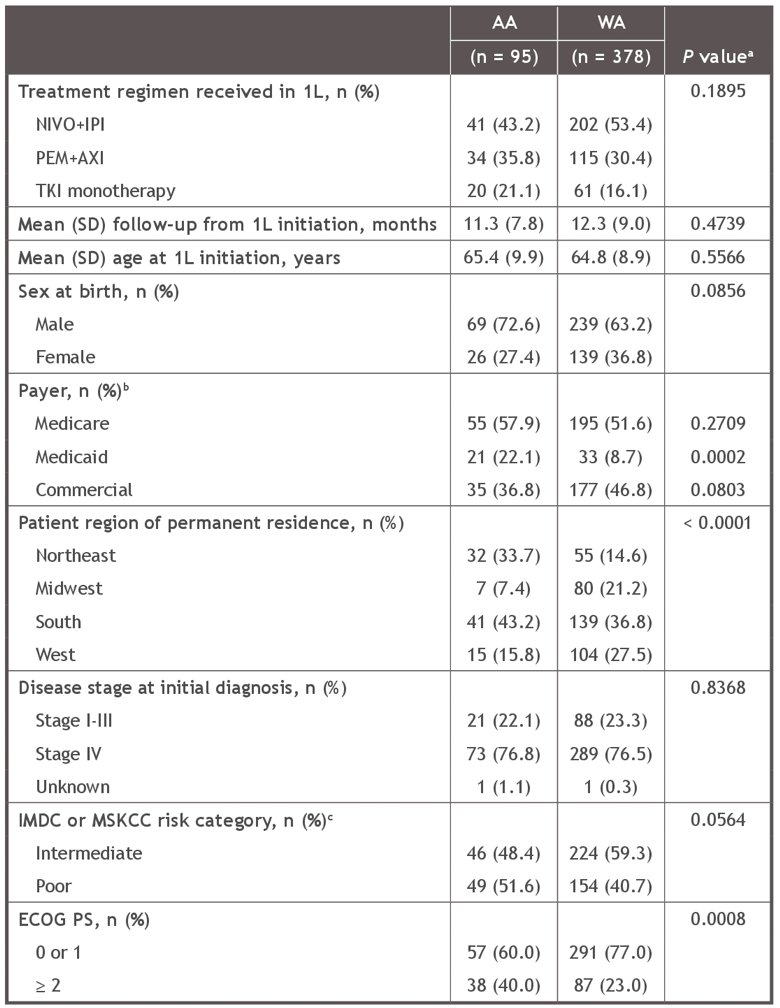(UroToday.com) The 2022 ASCO annual meeting featured a session on kidney and bladder cancer, including a presentation by Dr. Daniel Geynisman discussing racial differences in treatment patterns and outcomes of first-line therapies for advanced renal cell carcinoma (RCC) in the real-world setting. In first-line therapy for advanced RCC, nivolumab + ipilimumab and pembrolizumab + axitinib have demonstrated significantly improved clinical outcomes versus sunitinib in phase III trials. However, Black patients are grossly underrepresented in all advanced RCC trials. Little is known about the impact of racial differences on the use of first-line therapies and clinical outcomes in the real-world setting. At ASCO 2022, Dr. Geynisman and colleagues reported an analysis assessing the impact of racial differences in treatment patterns and outcomes in first-line therapies for advanced RCC in a real-world setting, with a focus on IMDC intermediate and poor risk patients.
This retrospective chart review included African American/Black and White American patients diagnosed with IMDC/Memorial Sloan Kettering Cancer Center (MSKCC) intermediate/poor-risk advanced RCC who initiated on first-line nivolumab + ipilimumab, pembrolizumab + axitinib, or tyrosine kinase inhibitor (TKI) monotherapy with sunitinib, pazopanib, or cabozantinib. Patients’ demographic/clinical characteristics and outcomes were abstracted from medical charts by treating oncologists. Use of first-line therapy, treatment discontinuation, and clinical outcomes including disease response, landmark progression-free survival, landmark overall survival, and treatment-related adverse event rates were assessed descriptively by race.
In total, 49 unique clinical practice sites contributed data on 473 intermediate/poor risk patients, of which 95 (20.1%) were African American/Black and 378 (79.9%) were White American patients. The Median follow-up for this analysis was 10.9 months. A higher proportion of African American/Black vs. White American patients had received first-line TKI monotherapy (21.1% vs. 16.1%). Complete baseline demographic and clinical characteristics are as follows:

Treatment discontinuation rate was higher in African American/Black vs. White American patients (49.5% vs. 43.4%). Treatment response was lower in African American/Black than White American patients (overall response rate [ORR]: 58.8% vs. 74.8%, p = 0.0036; complete response: 8.2% vs. 11.4%). The treatment-related adverse event rate was slightly lower in African American/Black vs. White American patients (25.3% vs. 32.5%). Stratified clinical outcomes including landmark progression-free survival and overall survival rates at 6 and 9 months (no difference for any survival outcome) are as follows:

Dr. Geynisman concluded his presentation by discussing racial differences in treatment patterns and outcomes of first-line therapies for advanced RCC in the real-world setting with the following take home messages:
- In this real-world intermediate/poor-risk advanced RCC cohort, no significant difference was observed in the utilization of standard of care IO-based therapy between African American/Black and White American patients
- However, with short-term follow-up, clinically meaningful differences in ORR were observed between these cohorts
- Treatment related adverse event rates were similar between the groups for nivolumab + ipilimumab, but 50% higher in White American patients than African American/Black patients for pembrolizumab + axitinib
Presented by: Daniel M. Geynisman, MD, Fox Chase Cancer Center, Philadelphia, PA
Co-Authors: Jonathan K. Kish, Angelica Falkenstein, Stephen Huo, Viviana Del Tejo, Lisa Rosenblatt, Sarah Guttenplan, Alexandrina Balanean, Bruce A. Feinberg
Affiliations: Cardinal Health, Dublin, OH, Cardinal Health Specialty Solutions, Dublin, OH, Bristol Myers Squibb, Princeton, NJ
Written by: Zachary Klaassen, MD, MSc – Urologic Oncologist, Assistant Professor of Urology, Georgia Cancer Center, Augusta University/Medical College of Georgia, @zklaassen_md on Twitter during the 2022 American Society of Clinical Oncology (ASCO) Annual Meeting, Chicago, IL, Fri, June 3 – Mon, June 7, 2022.


